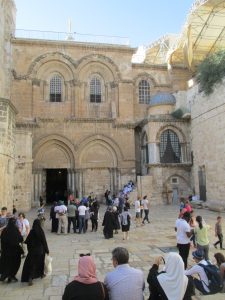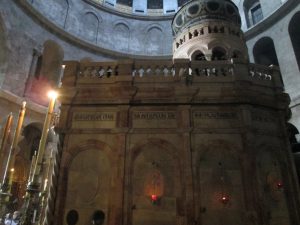The empty tomb and the empty cross
Two years ago, I visited Israel for the Gafcon conference. After dumping my bag at the hotel, I walked the two miles into the old city of

Photo by Stephen Walton
Jerusalem. There, hidden in the heart of a labyrinth of little streets and covered alleys, is the Church of the Resurrection, or as it is often called, the Church of the Resurrection. This, tradition claims, marks the site of Jesus’ death and burial; and in this case, there are good, archaeological and historical reasons to believe that the tradition is true.
During that week, I made three visits to the Church of the Resurrection, and each time I tried to get into the aedicula, the small church

Photo by Stephen Walton
within a church that is built over an ancient tomb cut into the rock, that is believed to be where Joseph of Arimathea laid the body of Jesus. But each time I was unsuccessful; either the queues to get in were too long, or there was a service taking place inside. So I never got to go into the tomb of Christ. But I don’t mind. It really doesn’t matter, because there is nothing to see. The tomb is empty.
That is what we will celebrate this week at Easter- the emptiness of Jesus’ tomb. He is not there- he is risen! The resurrection is not simply a beautiful thought, or an inspiring story. It is about something that really happened, that Jesus rose physically and personally from the dead, leaving behind an empty tomb. The resurrection is not a story about Jesus escaping the material world where there are viruses, suffering, and death; nor is it a story about how we may escape from that world, either in imagination or in spirit. The resurrection is about the power of God battering down the doors that separate heaven and earth, and bursting into our world, invading it with life-giving energy, and raising a physical body to real life again, leaving behind an empty tomb. This is why it is a message of hope for those who find themselves facing the reality of death; the resurrection is not an escape from reality, but the overcoming of death by a greater reality. This is the message of the empty tomb.
There is also another emptiness that we will celebrate this week, on Good Friday; the emptiness of Jesus cross. At the front of Christ Church is a cross, but not a crucifix. A crucifix has a model of the dying Christ; but the cross is empty. When we remember Jesus’ death on Good Friday, we are not trying to wallow in emotion. We mourn for our sins that took him there, and the cross should make us weep when we think of the price that he paid; but the point of Good Friday is not to make us feel sorry for Jesus, or to make us feel bad about ourselves, or to wind up our emotions. There would be a great danger in this; we might to think that the greater the degree of emotion we feel, the more acceptable we are to God. Almost the last words that Jesus cried out on the cross were “It is finished!” (John 19:30). It was a cry of victory and triumph. He had done it, he had paid in full and more the price of our sins, and completely satisfied the wrath of God. He had left nothing for us to do, left no satisfaction for us to make; his work was finished. So we have an empty cross, not a crucifix, in church, because Christ’s work is finished. On Good Friday we will remember with joy and thanksgiving the finished work of Christ.
This Easter Sunday probably will feel strangely empty. Due to the restrictions designed to stop the spread of Covid-19, we cannot meet to worship, and our church buildings have to stay locked shut. It may feel more like Saturday, when Jesus lay in the grave, rather than Easter Sunday. In the whole history of the Christian church, there will never have been an Easter like it; although we are getting a taste of what worship has been like for many believers who live under communist or Islamic regimes, where they have had to meet in secret for fear of persecution. It may feel empty. But the truth does not depend on our feelings; it depends on Jesus Christ and what he has done. The tomb is empty. The cross is empty. He has done it.
STEPHEN WALTON

